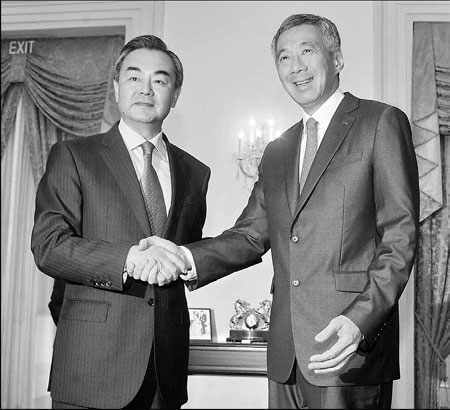FM wraps up tour on note of stability
|
Foreign Minister Wang Yi (left) shakes hands with Singaporean Prime Minister Lee Hsien Loong during a meeting at the Istana presidential palace in Singapore on Friday. Wang was on a two-day visit in Singapore, his first official visit as foreign minister. Mohd Fyrol / Agence France-Presse |
China and ASEAN members reach consensus on maintaining peace
China attaches great importance to its ties with neighboring countries and places ASEAN at a prioritized position in its relations with surrounding neighbors, Foreign Minister Wang Yi said on Sunday before wrapping up a five-day visit.
China and members of the Association of Southeast Asian Nations have reached a consensus that the two sides are fully capable of maintaining peace and stability in the region, including in the South China Sea, Wang said in a joint interview with Chinese media outlets.
During the trip that started on Tuesday, Wang stressed Beijing's pledge to build up respective bilateral ties and determination to ensure regional stability in his four stops, which included Thailand, Indonesia, Singapore and Brunei.
Wang's visit not only reaffirmed the consistent policy of the Chinese government in its ties with ASEAN as well as the South China Sea issue, but also revealed the fruitful consensus reached during the trip for pragmatic cooperation, and enhanced China's image as a constructive player in the region, observers said.
Ruan Zongze, vice-president of the China Institute of International Studies, said Wang's first trip to the four Southeast Asian countries displayed the new Chinese leadership's diplomatic priority on ties with neighbors. The trip followed President Xi Jinping's first trip in March to Russia and emerging economies in Africa.
"The visit demonstrates that China's ties with Southeast Asian countries are stable and have a sound basis and the ties with ASEAN members are not as fragile as hyped by some media reports," Ruan said.
During his stopover in Brunei on Saturday, Wang and his counterpart agreed to intensify exchanges, increase mutual trust and advance cooperation, thereby contributing to the prosperity and development of the region.
This year marks the 10th anniversary of the establishment of the strategic partnership between China and ASEAN. The trip was made amid ups and downs of maritime disputes regarding China and some ASEAN members.
Strategic partnership
"We should be cautious of some parties and countries provocations and trouble-making moves in this region for the sake of their own interests," Wang said at the joint news conference after meeting with his Indonesian counterpart on Thursday, a clear response to accusations of China's so-called assertive posture regarding the South China Sea.
In Singapore and Thailand, Wang and leaders from the countries pledged to further expand and deepen the strategic partnership between China and ASEAN, as the latter works on establishing an ASEAN "community" and accelerates regional integration.
As for China's position on South China Sea issues, Wang stressed in the news conference after meeting his Indonesian counterpart Marty Natalegawa that the Chinese government has a clear, steadfast and consistent resolve in safeguarding state sovereignty and territorial integrity.
Luo Yongkun, a researcher at the China Institute of Contemporary International Relations, said the South China Sea issue has been played up under the media limelight against the backdrop of the changed geopolitical structure in the region, especially Washington's pivoting of its Asia policies in recent years.
"Some so-called US allies in the region hoped to take the opportunity to contain China," Luo said.
Manila claimed on April 26 that an international arbitration court had set up a tribunal to which it took the South China Sea dispute for a verdict in January.
China rejected the Philippine move, demanding the country withdraw all its nationals and facilities from the islands and reefs that are "illegally occupied".
"The Philippines' drive for international arbitration has run against the spirit of the DOC (Declaration on the Conduct of Parties) because the declaration requires contending parties to resolve territorial issues through bilateral negotiations," said Wu Shicun, director of the National Institute for South China Sea Studies.
However, there is no major trouble in communication between China and ASEAN members because they have a series of dialogue channels in place, including the ASEAN Regional Forum and the 10+1 grouping, Luo said.
China has always remained open to discussions on the Code of Conduct in the South China Sea, Wang said at the news conference on Thursday.
Contact the writers at zhangyunbi@chinadaily.com.cn and zhouwa@chinadaily.com.cn
(China Daily 05/06/2013 page11)















